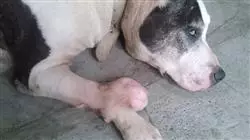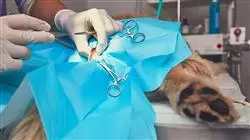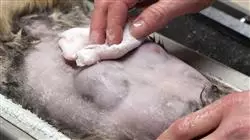University certificate
The world's largest faculty of veterinary medicine”
Why study at TECH?
Become one of the most demanded professionals today: Train in Nervous System, Cardiac, Genitourinary and Musculoskeletal Tumors in Small Animals with this complete online Postgraduate diploma”

The age of patients in veterinary consultations is increasingly higher, resulting in more frequent cases of cancer patients.
This intensive program compiles the different oncologic diseases that small animals experience. It addresses the development of the different tumors that affect the canine and feline species, focusing on the diagnostic and therapeutic approach, and including the latest treatments.
Small Animal Oncology is an internal medicine subspecialty which has experienced great development in the last decades. The professors on this Postgraduate diploma are at the forefront of the latest diagnostic techniques and treatments of oncologic diseases in small animals. Due to their specialized training, they have designed a useful, practical program adapted to the current situation, an increasingly demanding and specialized reality.
All the professors on the program are clinicians and/or university professors with experience in both undergraduate and postgraduate training. Professionally active, the professors are specialized in different areas involved in small animal oncology such as clinical oncologists, oncological surgeons, radiologists and anatomopathologists. The aim is to offer a Postgraduate diploma that takes a multidisciplinary approach to oncology.
This program specializes general practitioners in veterinary oncology in an area that is increasingly in demand, partly due to its prevalence, and partly to the specialization this area requires and demands.
All the modules compiled include the author's experience, without forgetting scientific rigor and the most important evidence-based updates. It addresses the diseases and action protocols, and it consideres the integral approach to patients, including disease, patient and owner.
The program also includes a large amount of multimedia material: photos, videos, diagrams, and imaging techniques and surgery.
As it is an online Postgraduate Certificate course, students are not restricted by set timetables, nor do they need to physically move to another location. All of the content can be accessed at any time of the day, so you can balance your working or personal life with your academic life.
You will benefit from the experience of expert professionals who have contributed their expertise in the area to this program, making it a unique opportunity for professional growth”
This Postgraduate diploma in Nervous System, Cardiac, Genitourinary and Musculoskeletal Tumors in Small Animals contains the most complete and up-to-date scientific program on the market. The most important features include:
- The latest technology in online teaching software
- A highly visual teaching system, supported by graphic and schematic contents that are easy to assimilate and understand
- Practical cases presented by practising experts
- State-of-the-art interactive video systems
- Teaching supported by telepractice
- Continuous updating and recycling systems
- Autonomous learning: full compatibility with other occupations
- Practical exercises for self-evaluation and learning verification
- Support groups and educational synergies: questions to the expert, debate and knowledge forums
- Communication with the teacher and individual reflection work
- Content that is accessible from any fixed or portable device with an Internet connection
- Supplementary documentation databases are permanently available, even after the course
Get a complete and adequate qualification in Nervous System, Cardiac, Genitourinary and Musculoskeletal Tumors in Small Animals with this highly effective training program and pave new ways to your professional advancement”
Our teaching staff is made up of professionals from different fields related to this specialty. That way, TECH ensures to offer the updating objective it intends to provide. A multidisciplinary team of professionals trained and experienced in different environments, who will cover the theoretical knowledge in an efficient way, but, above all, will bring the practical knowledge from their own experience to the course: one of the differential qualities of this course.
This mastery of the subject is complemented by the effectiveness of the methodological design of this Postgraduate diploma in Nervous System, Cardiac, Genitourinary, Musculoskeletal and Genitourinary Tumors in Small Animals. Developed by a multidisciplinary team of e-learning experts, it integrates the latest advances in educational technology. That way, students will study with a range of easy-to-use and versatile multimedia tools that will give them the necessary skills needed during training
The design of this program is based on Problem-Based Learning: an approach that views learning as a highly practical process. To achieve this remotely, TECH will use telepractice: with the help of an innovative interactive video system and Learning from an Expert, the student will be able to acquire the knowledge as if they were facing the scenario they are learning at that moment. A concept that will allow students to integrate and memorize what they have learnt in a more realistic and permanent way.
Make the most of the opportunity and take the step to get up to date on the latest developments in Nervous System, Cardiac, Genitourinary and Musculoskeletal Tumors in Small Animals"

Our innovative telepractice concept will give you the opportunity to learn through an immersive experience, which will provide you with a faster integration and a much more realistic view of the contents: “Learning from an Expert"
Syllabus
The contents of this program have been developed by the different experts on this course with a clear purpose: to ensure that our students acquire each and every one of the necessary skills to become true experts in this field.

A complete and well-structured program will take you to the highest standards of quality and success"
Module 1. Genitourinary Tumors. Nervous System Tumours
1.1. Female Reproductive System Tumors
1.1.1. Epidemiology
1.1.2. Diagnosis
1.1.3. Treatment
1.2. Male Reproductive System Tumors
1.2.1. Epidemiology
1.2.2. Diagnosis
1.2.3. Treatment
1.3. Urinary System Tumors (I)
1.3.1. Renal Tumors
1.3.2. Diagnosis
1.3.3. Treatment
1.4. Urinary System Tumors (II)
1.4.1. Urinary Bladder Tumors
1.4.2. Diagnosis
1.4.3. Treatment
1.5. Genitourinary Surgery (I)
1.5.1. General Principles of Reproductive System Surgery
1.5.2. Surgical Techniques in the Male Genital Tract
1.5.3. Surgical Techniques in the Female Genital Tract
1.6. Genitourinary Surgery (II)
1.6.1. Kidney Surgical Techniques
1.6.2. Ureter Surgical Techniques
1.6.3. Bladder Surgical Techniques
1.6.4. Urethra Surgical Techniques
1.7. Transmissible Venereal Tumor
1.7.1. Incidence and Pathology
1.7.2. Diagnosis
1.7.3. Treatment
1.8. Nervous System Tumors (I)
1.8.1. Brain Tumors
1.8.2. Diagnosis
1.1.3. Treatment
1.9. Nervous System Tumors (II)
1.9.1. Spinal Cord Tumors
1.9.2. Diagnosis
1.9.3. Treatment
1.10. Nervous System Surgery
1.10.1. Surgical Techniques for the Approach to Intracranial Tumors
1.10.2. Surgical Techniques for the Approach to Spinal Cord Tumors
1.10.3. Frequent Complications in Nervous System Surgery
Module 2. Hematopoietic Tumors
2.1. Hematopoietic System Tumors (I): Canine Lymphoma (I)
2.1.1. Etiology
2.1.2. Classification and Pathology
2.1.3. Clinical Signs
2.1.4. Diagnosis
2.1.5. Clinical Status
2.2. Hematopoietic System Tumors (II): Canine Lymphoma (II)
2.2.1. Multicentric Lymphoma Treatment
2.2.1.1. Re-Induction and Salvage Chemotherapy
2.2.1.2. Strategies to Improve Treatment Effectiveness
2.2.1.3. Immunotherapy and Other Treatments
2.3. Hematopoietic System Tumors (III): Canine Lymphoma (III)
2.3.1. Extranodal Lymphoma Treatment
2.3.2. Canine Lymphoma Prognosis
2.4. Hematopoietic System Tumors (IV): Canine Lymphoma (IV)
2.4.1. Lymphocytic Leukemia
2.4.2. Incidence, Etiology, Pathology and Classification
2.4.3. Clinical Signs and Diagnosis
2.4.4. Treatment
2.4.5. Prognosis
2.5. Hematopoietic System Tumors (V): Feline Lymphoma (I)
2.5.1. Incidence, Etiology and Pathology in Feline Lymphoma
2.5.2. Gastrointestinal / Dietary Lymphoma
2.6. Hematopoietic System Tumors (VI): Feline Lymphoma (II)
2.6.1. Peripheral Lymph Node Lymphoma
2.6.1.1. Mediastinal Lymphoma
2.6.2. Extranodal Lymphoma
2.6.2.1. Nasal Lymphoma
2.6.2.2. Renal Lymphoma
2.6.2.3. Central Nervous System Lymphoma
2.6.2.4. Cutaneous Lymphoma
2.6.2.5. Subcutaneous Lymphoma
2.6.2.6. Laryngeal Lymphoma
2.6.2.7. Ocular Lymphoma
2.6.2.8. Felines Lymphoma Prognosis
2.7. Hematopoietic System Tumors (VII): Feline Lymphoma (III)
2.7.1. Feline Leukemia, Myeloproliferative Disorders and Myelodysplasia
2.8. Hematopoietic System Tumors (VIII)
2.8.1. Canine Acute Myeloid Leukemia, Myeloproliferative Neoplasms, and Myelodysplasia
2.8.1.1. Incidence, Risk Factors
2.8.1.2. Pathology
2.8.1.3. Acute Myeloid Leukemia
2.8.2. Myeloproliferative Neoplasms
2.8.2.1. Polycythemia Vera
2.8.2.2. Chronic Myelogenous Leukemia
2.8.2.2.1. Eosinophilic and Basophilic Leukemia
2.8.2.2.2. Essential Thrombocythemia/Primary Thrombocytosis
2.9. Other Bone Marrow Disorders
2.9.1. Myelofibrosis
2.9.2. Myelodysplastic Syndromes
2.10. Hematopoietic System Tumors (IX): Plasma Cell Tumors
2.10.1. Multiple Myeloma
2.10.2. Solitary and Extramedullary Plasmacytic Tumors
2.10.3. Canine Histiocytic Disease: Feline Histiocytic Disease
2.10.4. Canine Histiocytic Disease
2.10.4.1. Cutaneous Histiocytoma
2.10.4.2. Cutaneous Langerhans Cell Histiocytosis
2.10.4.3. Reactive Histiocytosis
2.10.5. Histiocytic Sarcoma
2.10.6. Hemophagocytic Histiocytic Sarcoma
2.10.7. Feline Histiocytic Disease
2.10.8. Feline Histiocytic Sarcoma
2.10.9. Progressive Feline Histiocytosis
2.10.10. Pulmonary Langerhans Cell Histiocytosis
Module 3. Hemangiosarcoma. Thymoma. Cardiac Tumors. Musculoskeletal Tumors
3.1. Hemangiosarcoma (I)
3.1.1. Incidence and Risk Factors
3.1.2. Etiology
3.1.3. Diagnosis
3.2. Hemangiosarcoma (II)
3.2.1. Treatment
3.2.2. Prognosis
3.3. Spleen Surgery
3.3.1. Spleen Surgery Techniques
3.4. Thymoma
3.4.1. Diagnosis
3.4.2. Treatment
3.5. Cardiac Tumors
3.5.1. Diagnosis
3.5.2. Treatment
3.6. Thoracic Surgery (I)
3.6.1. Anatomy
3.6.2. Particularities of Thoracic Surgery
3.6.3. Thoracic Cavity Approaches
3.7. Thoracic Surgery (II)
3.7.1. Pericardiocentesis
3.7.2. Pericardiectomy
3.8. Musculoskeletal Tumors (I)
3.8.1. Osteosarcoma
3.8.2. Incidence and Risk Factors
3.8.3. Etiology
3.8.4. Diagnosis
3.8.5. Treatment
3.9. Musculoskeletal Tumors (II)
3.9.1. Other Bone Tumors
3.9.2. Feline Bone Tumors
3.10. Musculoskeletal Surgery
3.10.1. Biopsy Technique
3.10.2. Surgical Technique for Amputations

This program will allow you to advance in your career comfortably"
Postgraduate Diploma in Nervous System, Cardiac, Genitourinary and Musculoskeletal Tumors in Small Animals
TECH Global University presents the Postgraduate Diploma in Nervous System, Cardiac, Genitourinary and Musculoskeletal Tumors in Small Animals, a unique opportunity to expand your knowledge in the veterinary field. Our online classes will allow you to acquire the skills necessary for the diagnosis and treatment of tumors in small animals, giving you a competitive advantage in your veterinary practice. Online classes at TECH Global University offer numerous benefits. You will be able to access your education from anywhere and at any time that is convenient for you, without interruptions in your veterinary work. In our postgraduate course, you will gain in-depth knowledge of the tumors that affect these systems in companion animals; you will learn advanced diagnostic imaging techniques, pathology and specific oncological treatment for each type of tumor; you will understand the importance of early detection and a multidisciplinary approach in the management of tumors in small animals. You will also learn to work as a team with other animal health professionals, such as radiologists, oncologists and surgeons, to provide comprehensive and personalized care to your patients.
Become a specialist in the treatment of small animal tumors
Our educational approach is based on the combination of theory and practice, allowing you to apply the knowledge acquired in real clinical cases. You will be supported by experts in veterinary oncology, who will guide you and share their experience to maximize your learning and professional development. At TECH, we are proud to offer a Postgraduate Diploma that will allow you to stand out as a veterinarian and provide quality care to your patients. Don't miss the opportunity to grow professionally with our Postgraduate Diploma in Nervous System, Cardiac, Genitourinary and Musculoskeletal Tumors in Small Animals! Get ready to be a reference in the fight against animal tumors and make a difference in your patients' lives.







